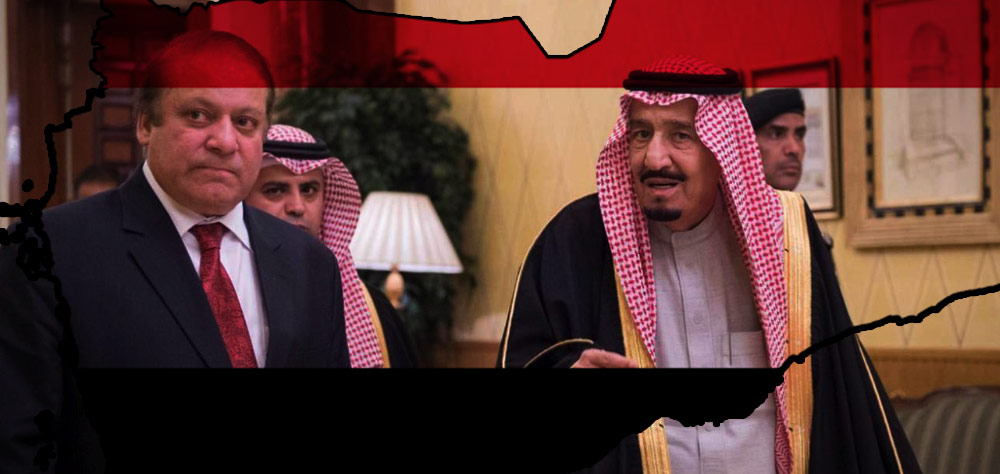Alwaght- Failure to develop economically, the domestic policy of instrumental exploitation of the radical Islamism, and long-lasting tensions with the neighboring India push the Pakistani to submit to the international powers and the Persian Gulf Arab states' agenda that revolves around fueling the conflicts rather than seeking peace and de-escalation of tensions.
On the other side, Pakistan, a nuclear power with about 110 warheads, knows that expanding relations with the non-democratic Arab regimes and even worse standing in the face of the Iran-led Axis of Resistance will bring it consequences. Should Pakistan go this direction, it will lose Iran's support in the face of India on the one hand and would be stripped of considerable support of Saudi Arabia and even the US on the other hand. Therefore, the Pakistani leaders have always tried to adopt an unbalanced policy towards Iran and Saudi Arabia, two major rivals in West Asia region. But how about the Yemeni crisis? Does unbalanced diplomacy work with this conflict?
As it appears, Pakistan has embarked on opportunistic and profit-seeking foreign policy on the Yemeni case. Upon start of the Saudi Arabian aggression against Yemen, Pakistan stated that any threat to the Saudi territory would meet Islamabad's "strong" response. But soon after the pro-Riyadh statement of the government, the Pakistani parliament passed a bill to keep the state neutral in Yemen war, which meant declining Saudi backing demand. The parliament's decision discomforted Saudi Arabia and even made frayed the Saudi-Pakistani relations. But the move was quite justified for Pakistan with respect to its erratic strategy towards the regional actors.
Nearly a year after Islamabad's neutrality announcement in 2016, the four-star retired Pakistani general General Raheel Sharif said that he was offered the post of commander of the so-called Islamic Military Alliance led by Saudi Arabia. The Pakistani general took the job after his conditions were met by Riyadh.
Sharif's assumption of the post raised questions about the Pakistan's neutrality policy in the Yemeni conflict while the decision was a violation of the parliament's bill. Pakistan could satisfy Saudi Arabia by avoiding lending its general to lead the anti-Yemen coalition and instead offering other indirect helps to the Saudi-led military alliance. On the other side, by declining to be engaged directly in the crisis, Pakistan could avoid encountering with Iran and the Resistance camp as a whole.
Other strategic issues should be linked to the decision. The first one is the Saudi decline to realize its goals against Yemen's Ansarullah movement. Saudi generals initially boasted of a sweeping win over the Yemeni revolutionaries and consequently capturing Sana'a the capital. But this projection did not take place, sending not only Saudi Arabia but also its supporter the US into the spins as the Tehran-led camp appeared winner of the geopolitical game not only in Yemen but also in Iraq and Syria, where Riyadh and Washington supported militants fighting the central governments. This was a motivation for the US, Saudi Arabia, and Pakistan— three of them holding a wealth of experience in creating terrorist groups— to put high on their military and security agenda curbing further Resistance camp's regional influence.
Second, the Pakistani officials' stances can signal that they want to trivialize for Iran their going on board of the Saudi-led camp. Responding to the criticism by Iran's regional orbit, the Pakistani leaders argue that their contribution to the anti-Yamani coalition is limited, and that they only support Saudi Arabia's fight against al-Qaeda in Yemen. Al-Qaeda terrorist group was devised by the US, Saudi Arabia, and Pakistan in the 1980s to fight the Soviet army in Afghanistan. So far, the terrorist group proved pro-Riyadh in the Saudi Yemen campaign.
But so far Pakistan skipped official confrontation with Iran in favor of Saudi Arabia as it has to be responsive to the internal and even global public opinion. To put it differently, Pakistan wants to paint itself as an independent state, without any dependence on the Persian Gulf Arab states headed by Riyadh.
Indedd, Islamabad, although, seeks to pose as a neutral and even an anti-terror party in regional crises, it is in league with the US-Saudi alliance in the region.



























